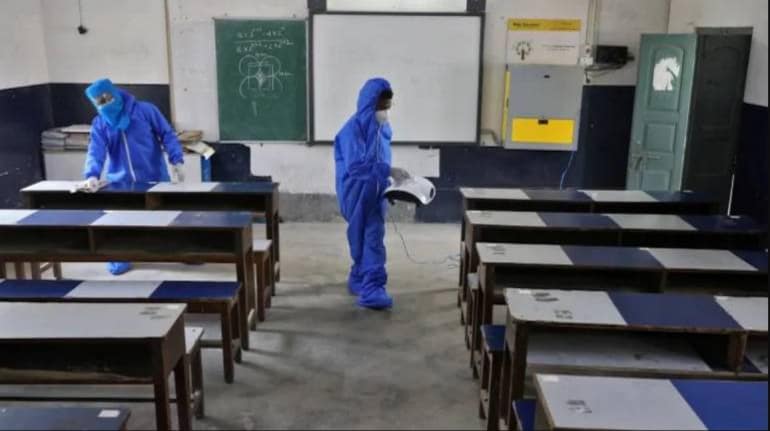



After a long recess, schools will be reopening in Mumbai from October 4 for classes 8-12th and the Brihanmumbai Municipal Corporation (BMC) in its order dated September 30 has also issued detailed guidelines for the reopening of schools.
The guidelines include approval of school management committee and consent of parents, mapping the school with nearest primary health centre, vaccination of school staff or RTPCR testing, daily thermal scanning of students, masks are mandatory, among others.
Manish Rastogi, CEO VIBGYOR Group of Schools, has highlighted some of the guidelines.
"Students will be permitted to attend class only if the same is authorised in writing by their parents. All students coming to school will be required to wear face masks, and those with COVID-infected family members will be advised to continue studying from home. Campus personnel will be required to wear face masks on the school premises and regular temperature checks will be conducted for students and staff."
He added medical care stations are also being set up around the campus, for quick access by students in case they feel unwell.
While schools are gearing up to restart after being shutdown since March 2020 lockdown, there are some challenges ahead of them in terms of reopening.
What challenges schools will face while reopening?"The primary challenge is to convince parents to send their children to school. Our school infrastructure gives us the opportunity to adhere to the safety protocol. Our children have witnessed uncertain times, it has disturbed them, it has hampered their growth and learning, some children have completely forgotten to open up and share their feelings and emotions. It will be challenging to bring them back to normalcy," said Allan Andersen, Director, Chaman Bhartiya School.
He added that another challenge will be to assure parents that the school is safe for their children. "Maintaining safety at school will also be a challenge," he added.
"Putting down the protocols on paper is the easy part. The harder thing is implementing them. How do you maintain social distancing indoors when there are 30-40 students in each class? How do you ensure students are wearing masks throughout," Yashovardhan Poddar, co-founder of Openhouse, a platform that has tied up with schools to conduct extra-curricular classes concurs.
Madhuri Ayyella, Principal, Narayana e-Techno School, pointed out that transportation of students is another challenge.
Along with transportation and following safety protocols, Poddar said that allowing for flexibility will be difficult. "Schools cannot force each and every student to come in. How do you ensure that students who aren't able to come in will not fall behind the rest of the class?"
How will schools conduct classes?This is why schools will be following hybrid class model despite restarting physical classes.
"Considering that COVID has not yet died down and there is a possibility of another wave, we have spoken to our students on how comfortable they feel about attending face to face lectures. Some would prefer to come to class and some would prefer to continue online lectures. Hence, we are following a hybrid model where we will offer some batches with physical lectures and some with purely online interactions," said Dr. Akhil Shahani, Managing Director, Thadomal Shahani Centre for Management, part of The Shahani Group of Institutions.
Even Ayyella will be offering hybrid classes but she said "this is a challenge for teachers since they must manage two forums simultaneously."
"In the shorter term, education isn't going to be completely online or completely offline. The more likely model is a hybrid one. Nobody has done that before, so everyone's figuring it out. I think schools are also figuring out what hybrid really means for them," added Poddar.
Are parents and children ready to be back to school?"As of now, close to 50% of parents are comfortable sending students to school. We will wait till this number is 75% and above before making a decision," said Narayana e-Techno School's Ayyella.
Poddar said that some of the parents they have spoken to have been honest that the last year has been hard for them.
"Engaging their children meaningfully has been a challenge. They are looking forward to sending their children to schools because that means that life can return to normal for them also. For parents of younger children, the risk of their children falling behind is greater than the risk of COVID."
However, Andersen said that parents are confused about sending their wards to school. "Some feel we should go ahead, and others are hesitant," he added.
As for children, he said that adjusting to going to school on a daily basis might not come automatically to them. "It is possible that some children, especially introverted ones will find it difficult to connect to other children and the teachers."
Dr. Sapna Bangar, Psychiatrist & Head, Mpower - The Centre, Mumbai, a mental healthcare setup, also pointed out that a majority of the children will have a period of readjustment when the schools are open for offline classes.
"Some children especially from the pre-primary and primary have grown dependent on their parents so they may find it a bit more difficult than the older children. Also, there has been a gap in their social learning due to the isolation which might create difficulty for them at the start."
While children going back to schools will face difficulties, Bangar believes that children are a resilient lot. "After a period of initial adjustment should be able to settle well in schools," she said.
Discover the latest Business News, Sensex, and Nifty updates. Obtain Personal Finance insights, tax queries, and expert opinions on Moneycontrol or download the Moneycontrol App to stay updated!
Find the best of Al News in one place, specially curated for you every weekend.
Stay on top of the latest tech trends and biggest startup news.